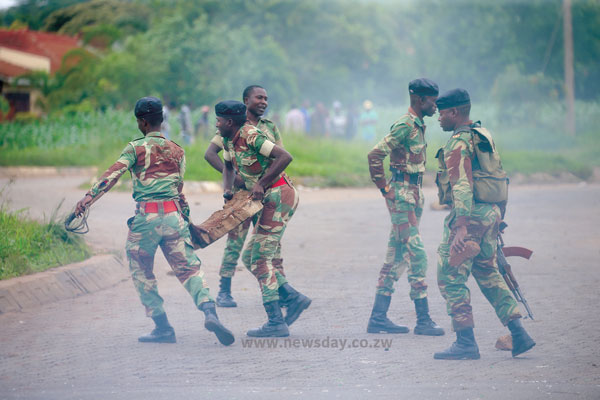
Armed military personnel and trucks maintained a heavy presence in residential suburbs as schools, most shops and banks remained closed despite the end of a three-day national stayaway.
By Staff Reporters/Own Correspondents

Soldiers and police officers had to escort a few buses ferrying commuters in a bid to guarantee their safety, particularly buses ferrying civil servants.
The move followed pledges by government that they would ensure the safety of commuters going to work and those going about their business would do so freely.
In the morning, NewsDay witnessed government buses being manned by heavily armed uniformed police officers, who stood by the door as the employees disembarked. There was a heavy presence of the army at most pick-up points for commuters.
The nationwide protests, sparked by fuel price increases, have resulted in loss of life and property as running battles between the police and the protesters spilled out of control.
The military also maintained a heavy presence in residential suburbs like Epworth and Chitungwiza, where there were reports of intimidation and wanton beating up of people in their homes.
Military trucks patrolled high-density areas, with few commuter omnibuses operating, while tension remained high among ordinary people, as most of them did not report for duty after the national shutdown.
- Chamisa under fire over US$120K donation
- Mavhunga puts DeMbare into Chibuku quarterfinals
- Pension funds bet on Cabora Bassa oilfields
- Councils defy govt fire tender directive
Keep Reading
At Warren Park D shops, more than 20 armed soldiers were seen roaming the shopping centre and keeping a close eye on citizens who had gone for either beer drinking or shopping at the few shops that had opened.
It was the same at Kuwadzana 2 and at Queensdale Shopping Centre, as most businesses opened, but only for a few hours.
In the city centre, a few shops were opened, while most banks remained closed for fear of the violence that rocked some parts of the country as Zimbabweans demonstrated over the deteriorating economy.
Supermarkets that had opened in the morning closed early.
A few shops that were still trading at unchanged prices had to deal with increased volumes of customers.
In Marondera, a heavy police and army presence characterised the town, with no public transport in sight.
In Gweru, most businesses remained closed despite an end to the three-day long mass stayaway.
The majority of transport operators also did resume plying their routes.
Fuel service stations also remained shut, as a tense environment persisted.
“There are fears the violence which occurred might be repeated, so businesses are still very gripped by anxiety. We, however, expect all to be well going forward,” Gweru mayor Josiah Makombe said.
In Kwekwe, pupils were sent back home due to the non-availability of teachers and service stations were closed, while in Norton pupils did not go to school despite teachers being at work.
The same was for Mutare, although a few shops had opened and closed early.
In Karoi, uncertainty continued to grip several supermarkets as well as long-distance bus operators, who shunned Chikangwe bus terminus.
The three-day national shutdown was organised by the Zimbabwe Congress of Trade Unions (ZCTU) on Monday to push for government to revise its recent fuel price hikes as well as remove bond notes.
In Beitbridge, the situation reverted to normal, with banks and shops all open since most people are self-employed.
Only one person, Bhekimpilo Mbedzi, was arrested and charged with inciting public violence.
He was denied bail by magistrate Langton Mukwengi, who said he would interfere with witness and cause further violence as his other suspected accomplices were still at large.
In Bulawayo city centre, business was still low, with only two supermarkets open to allow people to get basic commodities they had run out of during the three-day long stayaway.
The stayaway degenerated into riots and looting of grocery stores in townships such as Emakhandeni, Entumbane, Cowdray Park and Pumula East, among others countrywide.
Members of the military were controlling queues in the Bulawayo city centre.







